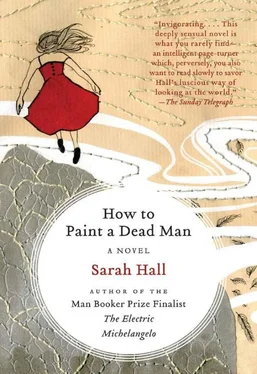Sarah Hall - How to Paint a Dead Man
Здесь есть возможность читать онлайн «Sarah Hall - How to Paint a Dead Man» весь текст электронной книги совершенно бесплатно (целиком полную версию без сокращений). В некоторых случаях можно слушать аудио, скачать через торрент в формате fb2 и присутствует краткое содержание. Год выпуска: 2009, Издательство: Harper Perennial, Жанр: Современная проза, на английском языке. Описание произведения, (предисловие) а так же отзывы посетителей доступны на портале библиотеки ЛибКат.
- Название:How to Paint a Dead Man
- Автор:
- Издательство:Harper Perennial
- Жанр:
- Год:2009
- ISBN:нет данных
- Рейтинг книги:4 / 5. Голосов: 1
-
Избранное:Добавить в избранное
- Отзывы:
-
Ваша оценка:
- 80
- 1
- 2
- 3
- 4
- 5
How to Paint a Dead Man: краткое содержание, описание и аннотация
Предлагаем к чтению аннотацию, описание, краткое содержание или предисловие (зависит от того, что написал сам автор книги «How to Paint a Dead Man»). Если вы не нашли необходимую информацию о книге — напишите в комментариях, мы постараемся отыскать её.
, Sarah Hall, "one of the most significant and exciting of Britain's young novelists" (
), delivers "a maddeningly enticing read... an amazing feat of literary engineering" (
).
How to Paint a Dead Man — читать онлайн бесплатно полную книгу (весь текст) целиком
Ниже представлен текст книги, разбитый по страницам. Система сохранения места последней прочитанной страницы, позволяет с удобством читать онлайн бесплатно книгу «How to Paint a Dead Man», без необходимости каждый раз заново искать на чём Вы остановились. Поставьте закладку, и сможете в любой момент перейти на страницу, на которой закончили чтение.
Интервал:
Закладка:
Nowadays, people often don’t say I, as if they don’t want to be involved in the desperate act of being. No one is contented dwelling inside their existence any more. No one is secure. Identity can be chosen. You can be whoever you want to be, which means you should consider all the options before selecting yourself. People are aware of the heart, slopping about like a piece of lively meat inside the chest, as if it isn’t snug, as if it hasn’t been fitted right. They are constantly told that a better incarnation lies just over the horizon; all it would take to be joined with that preferable version is beauty, money, weight loss, fashion, confidence, talent, surgery, cosmetics, gymnasiums, a cordless drill, a new microwave, more sex.
The ruthless calibration of consumerism. For if this is all you’ve got, this single chance, this brief, blemished simian posing opposite you in the mirror, then hadn’t it better be refined, hadn’t it better be romanticised? The self is no longer made to measure. ‘I’ is simply the wrong size. If only that better, happier edition could be purchased and possessed. But it ghosts around out there, tantalising, beautiful, erstwhile. Meanwhile London is filled with laterals, crowding on to trains and buses, talking different languages, avoiding free newspapers. They tug at their exteriors, wrestle with their features, and recast themselves in conversations. They are trapped inside the dull, deficient hides that Nature has unhelpfully allocated.
You are not yearning for improvement. You don’t want to be reborn from a womb of material idealism. You don’t wish to emerge, perfect and bright, out of the modern western chrysalis. You are not interested in living magnificently and utterly, certain that in this life you have triumphed. All you want is to be yourself again, because the identity that was once yours has vanished. Though a familiar face is reflected in the mirror, its anima is missing. You are absent.
There’s no real mystery of course, no complicated reason. The nub, the crux, the heart of the matter is this: Danny died a month and a half ago. You’ve lived six weeks, fourteen days, and several minutes longer than he.
Translated from the Bottle Journals
Today a journalist from the city came up here and admired the view and asked me why I paint these objects on the table. They are so plain and ordinary, he said. Why do you paint bottles and bottles and bottles? The same painting, over and over. What does it mean? He asked this of me as if it were answerable, as if it were important. And I said to him, I do not paint bottles. The man must have thought me mad or obtuse or cunning perhaps. He will, no doubt, blame the rustication of the place where I live, or my absence from the galleries and salons. He does not see choice. He does not see beyond the quartet of fruit in the dish, such as it is presented-a plum, two apricots and another plum. On the canvas he sees only the surface: the green paint and the grey and the white, which will not pass over a border unless it is directed. He considers quaint the long shadows taught to us by the academies.
To him, the painting on the easel is a funeral. It is careful and uncluttered, and it is not loud enough for him to understand. He does not have the practical training to recognise the discreet layers of vermilion used, their illuminating effect. If he had turned to the west during our conversation, he might have seen the sun setting behind the mountains, he might have seen the radiance of the sky.
But I am not whom he expects, this young traveller with his recording device and his pressed suit. He tells me he is sorry to hear of my ill health. He grieves on behalf of Italy. Then you must have acute indigestion, I said to him, and you will surely need some Averna to restore the balance. I assured him that I am quite well, merely old. I do not know who makes these reports, in which I am lying on my deathbed. Next week, he told me proudly, he is going to Milan to hear Miles Davis play his trumpet. How wonderful, I said. Now he has gone away, back to his apartment in the street with its commotion and motorcars and thin girls selling chips of ice. And he will write in the magazines and tell his friends that I am an artist of great simplicity and a man of great complexity. He will say that I like to make a joke when the issue of mortality is raised, and my body is profoundly stooped, and I show no sign of enlightening the world about the subject of my work. He will say that the paintings have a strange luminosity, but it is meaningless. The meaning is unavailable; it cannot be grasped. And they will photograph these bottles of mine for the exhibition catalogues, and in America I will upset the critics. They will say it is deliberate.
Look, I told the man, look again, because he had driven a long way to get here.
Theresa visits me once a day, sometimes twice if there is a delivery or laundry to be done. She brings my cigarettes, onions and anchovies, the usual things. She will let herself in without knocking and call out because she imagines one variety of noise disturbs me if I am at work in the studio while another does not. In her there is the bustle of the market where she has been shopping. Hurry is in her hands as she turns items over in the sink to rinse off the soap. There are tremors in her flesh from the broom’s short strokes. If asked she will turn the earth and uproot my garlic, some of which I give her to take away. I tell her to step over the basil, not to water it until it has parched completely, though she will often water it. The tomatoes she likes to bring inside, yellow-red, and she puts them in bowls against the walls, like ornaments. The lizards she sweeps into a pan, flicking them outside with broken tails. They scurry back into the house to begin their campaign again. She might think I want to paint her. I do not know her thoughts. In the winter she comes less often. The hill to Serra Partucci is too steep.
I receive other visitors, and more frequently than has been supposed. Antonio has begun keeping tabs on me. He would like me to move to a house less like the house of a peasant; he would prefer me in the apartment on the Via Fondazza in Bologna where he can call round regularly. The journalists are nervous if arriving unannounced. I do not believe it is stealth but perhaps they feel they will catch my true self. Then the enigma will finally be solved. Perhaps they think they will see me wearing a uniform, or performing a curse, or talking to the objects in the studio. They say the unmade roads remind them of the weddings of their cousins. They leave their motorcars down by the cypresses and walk up the slopes. If a bird skull or an iris catches their eye they will always pick it up and arrive holding it like treasure. Nature is found particularly in single objects here, though it is all around. For city dwellers Nature is invisible, located inside the weather brought to their towns, or inside their bodies when they visit the doctor to hear of its errors. To collect bones and items of colour is instinctual. They practise the language of still-life as they approach.
I like to be surprised by visitors though I can often hear the engines labouring and cutting out and the vehicles reversing back to the bottom of the hill, so I am not truly surprised, just anticipating the appearance of a face at the window. I always have the coffee ready to make by the time anyone arrives. Oh, you take honey to sweeten your coffee, they always say, how unusual, is it not unlucky? It is better not to begin debates about the importing of sugar, and from which states, so instead we talk of bees labouring in our golden fields. I put their stems in a basin to keep fresh and I put their bones on the kitchen table. Other times there will be a letter of inquiry first, with particular mention of this composition or that composition, or the old party, or a new theory, and I write back of course, come, but not on Thursday. On Thursday, if I am well, I teach in the local school. Such courtesy is not necessary but I can instruct them not to attempt the hill. If ever a car makes the climb all the way to Serra Partucci then I will be absolutely surprised and I will enjoy asking the driver of such a fine vehicle if they would like some coffee.
Читать дальшеИнтервал:
Закладка:
Похожие книги на «How to Paint a Dead Man»
Представляем Вашему вниманию похожие книги на «How to Paint a Dead Man» списком для выбора. Мы отобрали схожую по названию и смыслу литературу в надежде предоставить читателям больше вариантов отыскать новые, интересные, ещё непрочитанные произведения.
Обсуждение, отзывы о книге «How to Paint a Dead Man» и просто собственные мнения читателей. Оставьте ваши комментарии, напишите, что Вы думаете о произведении, его смысле или главных героях. Укажите что конкретно понравилось, а что нет, и почему Вы так считаете.












